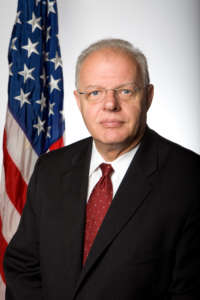Howard Schmidt, a pioneer in federal cyber, passes away
Howard Schmidt worked for Presidents Barack Obama and George W. Bush on cybersecurity issues and was a driving force behind a host of national strategies and...
The federal IT and cyber community lost one of its own last week. Howard Schmidt, the first cyber czar for President Barack Obama and a special advisor for cybersecurity under the President George W. Bush administration, passed away March 2 at his home in Muskego, Wisconsin.
Schmidt, 67, lost his battle with cancer. Memorial services will be held March 10 at Becker-Ritter Funeral Home: 14074 West North Avenue, Brookfield, Wisconsin 53005.
All those who are planning to attend please RSVP via email to SCHMIDTMEMORIAL@gmail.com.
Any personal pictures and stories are greatly welcomed at SCHMIDTMEMORIAL@gmail.com.
Schmidt’s impact on federal cybersecurity and on the people who are a part of it today remains strong and clear.
“Howard was a pioneer in cybersecurity, and one of the first to recognize that this was not a government or an industry challenge, but rather a shared challenge — one that required active collaboration and cooperation between the public and private sectors,” said Jeremy Grant, a managing director at the Chertoff Group and a former head of the National Strategy for Trusted Identities in Cyberspace (NSTIC) at the National Institute of Standards and Technology. “His years of service in government and industry — and more importantly, his dedication to making cyberspace more trustworthy for everybody — is something that we all benefit from today.”
Schmidt didn’t begin his career in the cybersecurity or even technology field. He enlisted in the Air Force and served three tours in Vietnam, where he earned three Bronze Stars.

Schmidt found his way to cybersecurity when he joined the FBI’s National Drug Intelligence Center where he led the computer exploitation team. He later moved to the Air Force’s Office of Special Investigations Computer Forensic Lab and Computer Crime Information Warfare Division.
President Bush appointed Schmidt in 2001 as the vice chairman and eventually chairman of the of the President’s Critical Infrastructure Protection Board and as the special adviser for Cyberspace Security for the White House in December 2001.
President Obama named him as the Cybersecurity Coordinator and Special Assistant to the President for National Security Affairs in 2009. Schmidt served in this role until he retired May 2012.
“Howard was one of the pioneers of cybersecurity,” said Jim Lewis, director and senior fellow of the Technology and Public Policy Program at the Center for Strategic and International Studies (CSIS), who worked closely with Schmidt and the White House on policy and legislative proposals. “In industry and as the first White House cyber coordinator, he blazed a trail that we all follow. He put years of work into better cybersecurity and the nation is better as a result.”
During his first White House stint, Schmidt was a driving force behind the first U.S. National Strategy to Secure CyberSpace in February 2003. The strategy highlighted three objectives, including to prevent cyber attacks against critical infrastructure, reduce vulnerabilities and minimize damage and increase recovery time. The document also outlined five national priorities, many of which are in place today including creating a National Cyberspace Security Response System and a nationwide training and education program.
When he returned to the White House, Schmidt oversaw an expansion of the administration’s role to oversee and work with industry around cybersecurity.
Among his biggest accomplishments was giving the Homeland Security Department operational authority over civilian agency networks.
The House Homeland Security Committee now wants to create a separate agency within DHS to focus solely on cyber challenges in the public and private sectors. This wouldn’t have been under consideration if not for recognizing the importance of DHS’s role and properly resourcing the agency.
Schmidt also provided support and White House cover for the NSTIC program and the development of the NIST framework for critical infrastructure.
Grant said Schmidt’s support of NSTIC is part of the reason why “six years after its launch, [NISTIC] has helped to catalyze a market of next-generation identity solutions that are now being built into the laptops and smartphones we use today.”
Along with his government service, Schmidt worked at eBay, Microsoft and was a police officer for the city of Chandler, Arizona.
In his later years, Schmidt was co-founder and partner of Ridge-Schmidt Cyber with retired Gov. and DHS Secretary Tom Ridge. He also served on boards, helped with non-profits and taught cybersecurity courses.
Schmidt is survived by his wife Raemaire and his four sons, their wives and eight grandchildren.
Return to the Reporter’s Notebook
Copyright © 2025 Federal News Network. All rights reserved. This website is not intended for users located within the European Economic Area.
Jason Miller is executive editor of Federal News Network and directs news coverage on the people, policy and programs of the federal government.
Follow @jmillerWFED



